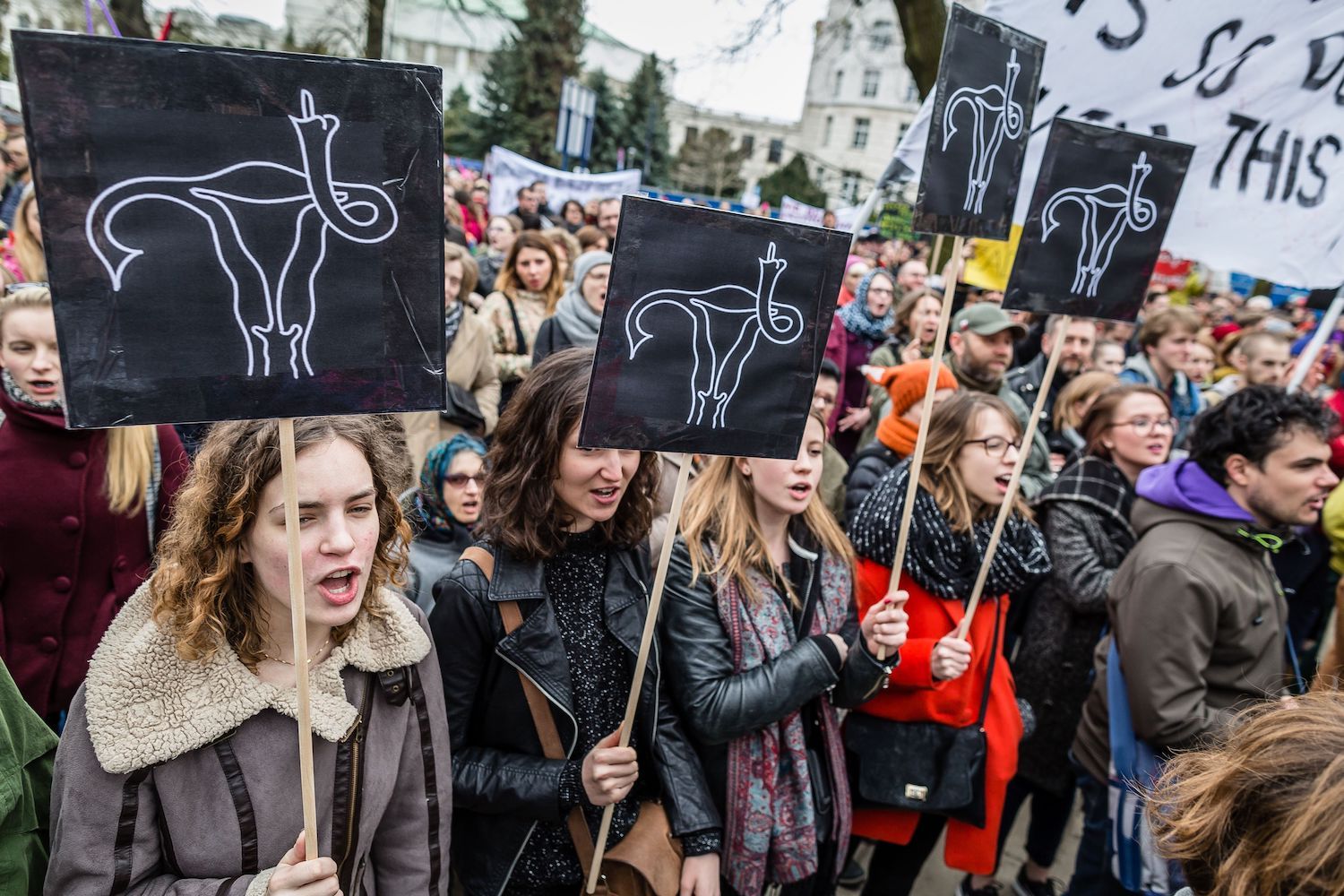The topic of legalising abortion in Poland has been recurring for the past four years. This conversation was brought to attention by the Polish women’s organisation ‘Strajk Kobiet’ (Women’s Strike). The resistance group was founded as a reaction to the government’s attempt to tighten up abortion law by banning eugenic abortion. Since then, women have been fighting for their basic human rights; to have the freedom to decide upon their bodies and futures. Significantly, it is stated in Poland’s Constitution that freedom and equality are indisputable values.
Article 30
The inherent and inalienable dignity of the person shall constitute a source of freedoms and rights of persons and citizens. It shall be inviolable. The respect and protection thereof shall be the obligation of public authorities.
Article 31
- Freedom of the person shall receive legal protection.
- Everyone shall respect the freedoms and rights of others. No one shall be compelled to do that which is not required by law.
Article 33
- Men and women shall have equal rights in family, political, social and economic life in the Republic of Poland.

Yet no one expected that at the peak of the second wave of coronavirus, Poland would suddenly become hell on earth for women. On October 22nd 2020, Constitutional Tribunal delegalized eugenic abortion in Poland.
Eugenic abortion is the most common type of abortion- 96% of all legal abortions taking place in 2015 were eugenic. It is a procedure following prenatal examination for cases where the fetus is deadly sick, has an incurable genetic condition or might not be able to live outside the mother’s womb and soon would die after the birth.
Poland, accompanied by Monaco, Vatican, San Marino, Andorra and Malta, has the most rigorous abortion law in Europe. Legal abortions do not acknowledge the socio-economic status of a female and whether she can afford to have a baby, whether she has graduated school or, in case of unwanted pregnancies, whether she wants to have a baby.
Bartlomiej Wroblewski and Piotr Uscinski submitted the document to the Constitutional Tribunal to check the accordance of current law introduced in 1993 with the Polish Constitution. These two representatives belong to the current governing party, PIS(Law and Justice). 13 out of 15 judges in the court were chosen by the PIS party and had some past political connections with it. One of the judges is from the previous candidacy related from the opposite party, whereas information about another judge is not available. As a result, the decision that has been made was not a choice of women, not a choice of their representatives, but the choice of the governing party and its conservative, euro-sceptical, Christian-democratic ideology.

Thousands of angry women initiated protests on the same day of the announcement last week. Women’s Strike does not give up and continues to fight the inhumane law imposed this month. They say “Abortion existed, exists and will exist.” The subject matter is whether it will be legal or not.
Women seeking abortion in Poland annually create market for abroad clinics in Germany, Czech, Slovakia, Austria and the UK. It is estimated that annually there are between 100,000 and 200,000 abortions in Poland, and 10-15% of it is conducted abroad. However, it is the women coming from wealthier families who can access abortion services abroad, whilst others simply cannot afford that.
So what is the reason for all of this? The defect can be noticed in the political system. Preliminary actions preventing the number of abortions and unwanted pregnancies in the first place should be increased. Sex education should be a compulsory subject at schools . 94,3% of students and 96,1% of parents believe that sex education is an important subject. Yet, 61.7% of students stated that the knowledge they obtained about sexuality came from their peers and 60.5% declared that they obtained their knowledge from the internet. As a result, information is not always evidence-based and does not come from reliable sources, leading to the proliferation of harmful messages. Additionally, there is still some stigma in society, which manifests itself in parents not talking about sex or sexuality with their children.

Due to the conscience clause stated in Article 39 from the 1996 law about the professions of doctor and dentist, doctors may refuse to perform medical operations on the patient if it is against their conscience. This imposes a number of obstacles on patients who need to act as quickly as possible and have to face probable rejection of support. For instance, if one needs emergency contraception, a prescription is necessary, for which a person might need to wait longer than 3 days. However, it is important to take the pill within those 3 days to prevent unwanted pregnancy.
If we consider the effects of this on the economy, the market abroad for eugenic abortions will increase, redirecting the capital outside the country. Impoverished families will struggle to make ends meet, having to provide support for the child without much help from the country. Furthermore, the support system will face overload, which will result in spending more money from the country’s budget on financial support for mothers. With more trauma, stress and feelings of helplessness, the mental health of hundreds of women will be damaged. Probably permanently.
Women already suffer enough having to make difficult decisions around whether to consciously abort their own kid, lacking support from their surroundings and their own country, as well as facing stress and despair. In a callous move to heighten this, the government decides for them and makes women give birth to babies without considering tragic consequences to people’s health and wellbeing.
“Access to legal, safe and comprehensive abortion care, including post-abortion care, is essential for the attainment of the highest possible level of sexual and reproductive health. “ – WHO

